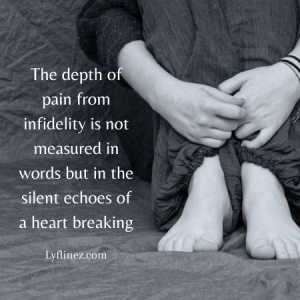Infidelity is a deeply painful experience that can leave lasting scars on those involved. It goes beyond a mere breach of trust; it shatters the very foundation of a relationship, leaving individuals grappling with a myriad of emotions and long-term effects. In this article, I will throw light on Why the pain of infidelity never goes away And How To Overcome It
Infidelity refers to the act of being unfaithful or disloyal to a partner in a romantic or marital relationship. It involves engaging in activities that breach the trust and commitment expected within the relationship, typically by having a romantic or sexual involvement with someone outside the established partnership. Infidelity can manifest in various forms, and its definition may vary based on cultural, social, and individual perspectives.

The Initial Shock Of Infidelity
The discovery of infidelity in a relationship often triggers a profound and intense emotional response, commonly known as the “initial shock.” This phase is characterized by a range of overwhelming emotions that can leave individuals stunned, confused, and emotionally distressed. The initial shock of infidelity is a critical juncture in the process of dealing with betrayal, and it typically unfolds in the following ways:
Surprise and Disbelief:
The revelation of infidelity often catches the betrayed partner off guard, leading to a sense of shock and disbelief. The initial reaction may be, “This can’t be happening,” as the reality of the situation begins to sink in.
Emotional Turmoil:
Intense emotional turmoil follows the initial realization. Feelings of anger, sadness, fear, and confusion may surge simultaneously, creating a whirlwind of emotions. The betrayed partner may struggle to make sense of the situation and come to terms with the breach of trust.
Physical Symptoms:
The shock of infidelity can manifest in physical symptoms such as nausea, trembling, chest pain, and difficulty breathing. The emotional distress experienced can have tangible effects on the body, reflecting the depth of the psychological impact.
Cognitive Dissonance:
There is often a cognitive dissonance between the image the betrayed partner had of their relationship and the new reality of infidelity. This internal conflict can lead to feelings of confusion and self-doubt, as the person grapples with reconciling the betrayal with their previous understanding of the relationship.
Overwhelmed by Questions:
The betrayed individual is likely to be flooded with questions about the nature and extent of the betrayal. Questions such as “Why did this happen?” or “How could they do this to me?” may dominate their thoughts, contributing to the emotional turmoil.
Loss of Security:
The revelation of cheat shatters the sense of security and stability within the relationship. What was once perceived as a safe and trustworthy connection is now undermined, leading to a profound sense of loss and vulnerability.
Impact on Self-Esteem:
The initial shock can have a significant impact on the betrayed partner’s self-esteem. The sense of being deceived can lead to feelings of inadequacy, unattractiveness, and a questioning of one’s own worth.
Inability to Focus:
The emotional intensity of the initial shock may make it difficult for the betrayed partner to concentrate on daily tasks. Work, personal responsibilities, and social interactions may be temporarily overshadowed by the emotional turmoil.
Isolation and Withdrawal:
Many individuals experiencing the shock of cheat may initially withdraw from friends and family. The shame, embarrassment, and the desire to process the situation privately contribute to a sense of isolation.
Future Uncertainty:
The initial shock often brings a sense of uncertainty about the future of the relationship. Decisions about whether to confront the unfaithful partner, seek counseling, or contemplate separation may seem overwhelming during this emotionally charged period.
It’s important to recognize that the initial shock is a natural and expected response to the discovery of infidelity.
Coping with this phase requires time, self-care, and, in many cases, professional support to navigate the complex emotions and decisions that follow.
As the shock begins to subside, individuals may enter a phase of processing, reflection, and potential rebuilding of the relationship or personal healing.

Why The Pain Of Infidelity Never Goes Away
The pain of infidelity can linger and have long-lasting effects on individuals and relationships for several reasons. While healing is possible, the emotional wounds caused by betrayal may never completely vanish. Here are several factors that contribute to why the pain of infidelity often persists:
Violation of Trust:
Infidelity is a profound breach of trust, a fundamental pillar of any healthy relationship. Once trust is shattered, it becomes challenging to rebuild it completely. The pain is a constant reminder of the betrayal, making it difficult for the injured party to fully let go.
Emotional Scars:
The emotional impact of infidelity leaves lasting scars. The betrayed partner may experience a range of emotions such as anger, sadness, and anxiety. These emotions can resurface, triggered by memories, certain situations, or even unrelated events, keeping the pain alive over time.
Loss of Security:
Infidelity often leads to a loss of the sense of security and stability within the relationship. Even if efforts are made to rebuild trust, the memory of this loss may linger, causing ongoing emotional distress.
Intrusive Thoughts:
Betrayed individuals often experience intrusive thoughts about infidelity. These thoughts can be triggered unexpectedly and bring back the pain as if the event is happening again. The inability to control or predict these thoughts contributes to the ongoing distress.
Impact on Self-Esteem:
Infidelity can have a detrimental effect on the self-esteem of the betrayed partner. The feelings of inadequacy, rejection, and questioning of one’s worth may persist, contributing to a prolonged sense of emotional pain.
Difficulty Rebuilding Intimacy:
Rebuilding intimacy and closeness after infidelity is a challenging process. The betrayed partner may struggle with fears of vulnerability and fear of being hurt again, making it difficult to fully engage emotionally in the relationship.
Trust Issues:
Even if attempts are made to rebuild trust, the scars of infidelity can lead to lingering trust issues. The betrayed partner may find it hard to trust not only the unfaithful partner but also others in subsequent relationships, perpetuating the pain.
Changes in Perception of Love:
The experience of infidelity can alter one’s perception of love and relationships. The idealized image of love may be replaced by a more cautious and guarded approach, preventing complete emotional healing.
Cultural and Societal Stigma:
Societal and cultural norms surrounding infidelity can also contribute to the persistent pain. Stigmatization, judgment, or societal expectations may add layers of emotional burden, making it challenging for individuals to move on.
Repetition in Thoughts and Conversations:
Discussions or thoughts about the infidelity, especially during arguments or moments of tension, can reopen emotional wounds. The repetitive nature of these discussions can hinder the healing process and keep the pain alive.
While the pain may never fully disappear, individuals and couples can still find ways to cope and move forward.
Healing often involves open communication, professional support, self-reflection, and a commitment to rebuilding trust.
Some couples can navigate through the pain and emerge with a stronger, more resilient relationship, while others may choose to part ways for their well-being.
The journey of healing is unique to each individual and couple.

You May Find Helpful
- How To Develop Transparency In A Relationship And Its Benefits
- Why Am I So Turned Off By My Husband – Reasons & Strategies
- How He Treats You Is How He Feels About You – Is It True?
- How To Be Submissive In A Relationship (20 Practical Tips)
Forgiveness vs. Forgetfulness
Forgiveness and forgetfulness are two distinct concepts, especially in the context of rebuilding a relationship after infidelity. While they are related, they carry different implications for the healing process.
Forgiveness involves a conscious decision to let go of feelings of resentment, anger, and the desire for revenge. It is an internal process that allows the offended party to release negative emotions and move forward, even if the memory of the betrayal lingers.
Forgiveness:
It is a crucial step in the healing process as it frees the betrayed partner from the emotional burden of holding onto anger and resentment. It is often a prerequisite for rebuilding trust, signaling a willingness to move forward and work towards restoring the relationship.
Additionally, forgiveness can contribute to personal growth, allowing individuals to transcend the pain and contribute positively to the relationship. However, it does not necessarily mean condoning or forgetting the actions that caused the pain. It is a personal choice to release negative emotions while acknowledging the reality of the situation.
Forgetfulness:
Forgetfulness in the context of infidelity, refers to the idea of intentionally or unintentionally suppressing or erasing the memory of the betrayal from one’s mind. While it may be tempting to want to forget the pain, deliberately trying to erase the memory may not be realistic or healthy.
Completely forgetting the incident may expose the relationship to the risk of repeating the same mistakes, and the human mind may not easily forget traumatic events. Attempting to force forgetfulness may lead to unresolved issues resurfacing later. It’s more realistic to acknowledge the memory while working towards healing and rebuilding the relationship.
Balancing forgiveness and remembering involves acknowledging the reality of the infidelity and its impact on the relationship.
Denying or suppressing the memory may hinder genuine healing. Instead of dwelling on the past, use the experience as an opportunity for learning, growth, and positive change.
Open communication about feelings and concerns is essential. Discussing the past can be challenging but is necessary for understanding each other’s perspectives.
Setting clear boundaries to prevent a recurrence of infidelity is crucial, requiring both partners to be aware of and committed to the agreed-upon expectations.
Forgiveness is a crucial component of rebuilding a relationship after infidelity, allowing for emotional healing and growth.
However, expecting forgetfulness may be unrealistic. Instead, acknowledging the past, learning from it, and fostering open communication are key elements of the healing process while maintaining a realistic understanding of the complexity of human memory and emotions.

Steps To Rebuilding A Relationship After Infidelity
Rebuilding a relationship after infidelity is a challenging and delicate process that requires commitment, open communication, and mutual effort from both partners. While there is no one-size-fits-all approach, here are some general steps that may help in the journey of rebuilding trust and intimacy:
Open and Honest Communication:
Establishing open, honest, and transparent communication is crucial. Both partners need to express their feelings, concerns, and thoughts about the infidelity without judgment. Encourage a safe space for vulnerability and active listening.
Understanding the Reasons:
It’s important to explore the underlying reasons for the infidelity. This involves a deep and honest examination of individual and relational issues that may have contributed to the breach of trust.
Take Responsibility:
The partner who engaged in infidelity should take full responsibility for their actions. This involves acknowledging the hurt caused, expressing genuine remorse, and being accountable for rebuilding trust.
Seek Professional Help:
Consider seeking the assistance of a qualified therapist or counselor experienced in couples therapy. A professional can provide guidance, facilitate communication, and offer tools for navigating the challenges of rebuilding the relationship.
Establish Boundaries:
Clearly define and communicate new boundaries within the relationship. This may involve setting expectations for communication, privacy, and interactions with others. Both partners should agree on these boundaries to create a sense of security.
Rebuilding Trust Gradually:
Rebuilding trust is a gradual process. Consistent actions and behavior that demonstrate trustworthiness over time are essential. Small, consistent gestures can go a long way in rebuilding confidence in the relationship.
Patience and Realistic Expectations:
Rebuilding a relationship takes time, and progress may not happen overnight. It’s important to have patience and realistic expectations. Allow each other the space and time needed for healing.
Couples Activities and Quality Time:
Engage in activities that promote bonding and connection. Spend quality time together doing things you both enjoy. This can help create positive experiences that contribute to the rebuilding process.
Individual Growth:
Both partners should focus on individual growth and self-improvement. This may involve addressing personal issues that contributed to the infidelity and working towards becoming better individuals for the sake of the relationship.
Forgiveness:
Forgiveness is a crucial component of rebuilding a relationship. It doesn’t mean forgetting the past, but rather, it involves letting go of resentment and cultivating a willingness to move forward together.
Regular Check-Ins:
Schedule regular check-ins to discuss the progress of the relationship. This provides an opportunity to address any concerns, celebrate achievements, and ensure that both partners feel heard and supported.
Rebuilding Intimacy:
Gradually reintroduce physical and emotional intimacy into the relationship. This may involve rebuilding emotional connection before working towards rebuilding the physical aspects of intimacy.
Learn from the Experience:
Use the experience as an opportunity for growth and learning. Understand the vulnerabilities in the relationship and develop strategies to prevent similar issues in the future.
It’s important to note that not all relationships can or should be rebuilt after infidelity.
The decision to move forward together should be a mutual one, and both partners must be committed to the process of rebuilding trust and creating a healthier, more resilient relationship.
How Past Infidelity Affects Future Relationships
Past infidelity can cast a long shadow on future relationships, shaping the way individuals approach trust, vulnerability, and emotional intimacy.
The impact of betrayal often lingers, leaving behind trust issues that can color the lens through which people view new partners.
Those who have experienced infidelity may grapple with an underlying fear of vulnerability, making it challenging to fully open up emotionally.
The memory of past betrayal can also influence communication patterns, with some individuals becoming more guarded or hesitant to express their feelings openly.
There is a risk of comparing new partners to unfaithful ones, potentially creating unrealistic expectations or unnecessary suspicion.
Overcoming the aftermath of infidelity in subsequent relationships requires a deliberate effort to address trust issues, communicate openly, and develop healthier coping mechanisms, recognizing that each relationship is unique and deserving of a fresh start.
How Cultural Background Influences Coping Mechanisms
Cultural background plays a significant role in shaping an individual’s coping mechanisms—the ways they manage stress, adversity, and challenges in life.
Coping strategies are influenced by cultural norms, values, belief systems, and social structures. Here are several ways in which cultural background can impact coping mechanisms:
1- Collectivism vs. Individualism:
Collectivist Cultures: In cultures that emphasize collectivism, individuals often turn to family, community, and social networks for support. Coping mechanisms may involve seeking guidance from elders, relying on group solidarity, and placing a strong emphasis on maintaining harmony within relationships.
Individualistic Cultures: In individualistic cultures, coping mechanisms may lean more toward individual autonomy. People might prioritize personal problem-solving, seek professional help, or focus on personal growth and self-improvement.
2- Expressiveness and Emotional Regulation:
High-Expressive Cultures: Some cultures encourage the open expression of emotions as part of coping. Talking openly about feelings, seeking emotional support, and engaging in cathartic activities are common coping strategies.
Low-Expressive Cultures: In contrast, cultures that place a premium on emotional restraint may prefer coping strategies that involve private reflection, maintaining emotional composure, and avoiding public displays of distress.
3- Religious and Spiritual Beliefs
Cultural backgrounds often influence religious or spiritual coping mechanisms. People from religious cultures may turn to prayer, rituals, or religious community support as part of their coping strategies. Spiritual beliefs can provide a framework for finding meaning in adversity.
4- Cultural Stigma and Mental Health
The stigma around mental health issues varies across cultures. In some cultures, seeking professional help for mental health concerns may be stigmatized, leading individuals to rely more on informal support networks or traditional healing methods.
Other cultures may prioritize mental health care, and individuals might be more inclined to seek therapy or counseling as a coping mechanism.
Understanding the influence of cultural background on coping mechanisms is crucial for mental health professionals, as it allows for more culturally sensitive and effective interventions.
Additionally, individuals themselves may benefit from recognizing and embracing culturally informed coping strategies that align with their cultural background and personal preferences.
Professional Guidance In Overcoming The Pain Of Infidelity
Overcoming the pain of infidelity often involves a combination of personal reflection, open communication, and, in many cases, seeking professional guidance.
1- Individual Therapy:
Engaging in individual therapy provides a private and supportive space to explore personal emotions, thoughts, and coping mechanisms. A licensed therapist can help navigate the complex emotions associated with infidelity, address self-esteem issues, and guide the individual toward healing and personal growth.
2- Couples Counseling:
Couples counseling is a valuable resource for partners who wish to work through the aftermath of infidelity together. A trained therapist can facilitate open communication, help rebuild trust, and guide the developing of healthier relationship patterns.
3- Sex and Relationship Therapy:
Infidelity can have a significant impact on the intimate aspects of a relationship. Sex and relationship therapists specialize in addressing these issues, and helping couples navigate challenges related to physical intimacy, trust, and communication.
Conclusion
Overcoming the pain of infidelity is a challenging and complex process that involves both personal and relational healing. The impact of betrayal extends beyond the individuals involved and can affect the dynamics of the relationship, trust, and emotional well-being. Recognizing the need for professional guidance is a crucial step toward navigating this difficult journey.
The process of overcoming infidelity often involves a commitment to personal growth, open communication, and, in some cases, a reevaluation of the relationship’s dynamics. Seeking professional guidance is not only a practical step but also an acknowledgment of the complexity of emotions and the need for external support.

